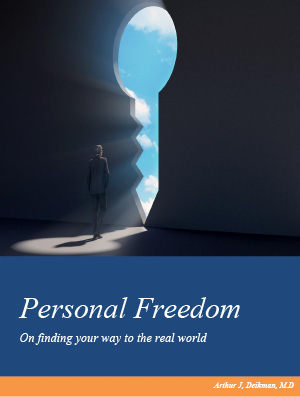ARTICLES
Excerpts – How Do You Spend Your Day?
Extract from the Book by Arthur J, Deikman, M.D
On waking in the morning, things are unsorted. The first stumbling stepsinformed by a foggy vision give way to clear re-entry into thefamiliar.You wash your face, you brush your teeth, without realizing thesensations of your present moment. Before long, your thoughts begin:remembering, planning and drifting briefly into fantasy. Thoughts of theday’s work, yesterday’s events and wishes for the future, all perform anact of transmigration, and you fly through your breakfast world, onlyoccasionally aware of the taste of the food and it’s texture, or the colourand light of the room. Your day of fantasy has begun.


Excerpts from Personal Freedom
On finding your way to the real world
In Personal Freedom Dr. Arthur Deikman shows us a key to unlocking the door of this invisible prison of ideas that has enclosed us since birth. We deceive ourselves, he demonstrates, by taking our identities from the people around us instead of looking closely at what we actually are. With a lyrical yet scientific approach he enables us to see the possibility of freedom and to take steps to make that freedom our own.
“You are the lever you can use that no one else possesses”. Dr. Deikman writes, “And your place is occupied by you alone. What place is yours? Where and how will your energy flow when you set it free? Your real life is there awaiting you”.


An Excerpt – 7 ways business can be agents for peace
Project Lead, Environmental Resilience, World Economic Forum Geneva
The last decade has shown a steady decline in the level of peace around the world, as civil wars, terrorism and rising violence become increasingly prominent. The costs of this are huge, with the impact of violence on the global economy calculated as equivalent to $1,988 per person, or 12.4% of global GDP.
These costs disproportionately affect the poor. The poor are more likely to be affected by conflict in the first place; by 2030, nearly half of the world’s poor are expected to live in conflict-affected situations. Conflict also serves to further entrench economic development challenges.


An Excerpt – Why we view the world differently
UCLA psychologist Matthew Lieberman explains why people don’t view the world the same way others do.
Why are we so sure that the way we see people, situations and politics is accurate, and the way other people see them is foolishly wrong?
The answer, according to new research by UCLA psychology professor Matthew Lieberman, lies in a region of the brain he calls the “gestalt cortex,” which helps people make sense of information that is ambiguous or incomplete — and dismiss alternative interpretations.
The answer, according to new research by UCLA psychology professor Matthew Lieberman, lies in a region of the brain he calls the “gestalt cortex,” which helps people make sense of information that is ambiguous or incomplete — and dismiss alternative interpretations.


How biohistory affects human nature (Excerpts)
Jim Penman tells Ivan Tyrrell how biology drives our social history, explaining temperament change within cultures and the rise and fall of civilisations.
Biohistory is the study of the biological roots of human social behaviour, explaining the outbreak of wars, economic growth and decline, and different styles of government. It proposes that such events reflect changes in the prevailing temperament of the population, which, in turn, is rooted in epigenetics – which explains how the expression of genes is affected by environmental influences and how this expression can be passed on down the generations, influencing hormones and brain activity and how we think, feel and behave.


The Importance of Sleep (Excerpt) By – Human Givens
We all take sleep for granted until we have problems with it and then we quickly remember how desirable a good night’s sleep is.
It is important for teachers, psychotherapists, employers and others to know something about it if they are to be effective.
This is because all human abilities (like paying attention, memory recall and learning) are made worse by poor sleep and there is an intimate relationship between sleep and many psychological conditions — for example, depression, anxiety and psychosis


An Excerpt – The Neurophysiology of Everyday – Is Our Reality Really Real
God 4.0 – Dr. Robert Ornstein & Sally Ornstein
This book is a stunning unification of science and tradition. It presents a concept of spirituality to address the challenges of the modern world.
It explores how our “everyday” mind works as a device for selecting just a few parts of the outside reality that are important for our survival. We don’t experience the world as it is, but as a virtual reality – evolved to keep us safe and to ensure our survival. This system, though essential for getting us safely across a busy street, is insufficient for understanding and solving the challenges of the modern world.


An Excerpt from ‘The WEIRDest People in the World’
by Joseph Henrich
Unlike most who have ever lived, WEIRD people are highly individualistic, nonconformist, analytical and control oriented.
How did WEIRD populations become so psychologically peculiar? What part did these differences play in our history and what do they mean for our collective identity?
How changing family structures, marriage practices and religious beliefs in the Middle Ages shaped the western mind, laying the foundations for the world we know today.
Brilliant, provocative, engaging and surprising, this study will help us understand who and how – we are now.



